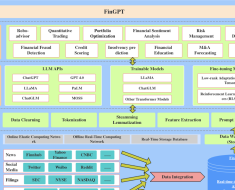
A recent global survey of MBA and university undergraduate and post-graduate business programs shows that artificial intelligence (AI) is being integrated into curricula. This November survey involved answers from more than 4,000 business schools and was published by the Graduate Management Admission Council (GMAC).
GMAC is a global association of leading graduate business schools. More than 13 million students visit its online resources to learn about MBA and university business programs,c connect to them and get curriculum and other advice.
The GMAC survey noted that prospective MBA and business students saw AI as an essential tool and wanted to see business school curricula coverage where they enrolled. States Joy Jones, CEO of GMAC:
“There is no doubt that business schools have taken it up a notch in responding to market imperatives in technological advancements, without losing sight of delivering core competencies like strategic thinking and problem-solving.”
Another recent GMAC survey involved almost 1,000 corporate recruiters with half representing Global Fortune 500 companies. Its results showed that employers were increasingly aware of business schools wrestling with the challenge of student use of AI. The majority of employers didn’t express alarm about the use of AI noting that the technology would increasingly play a role in their business operations within the next five years.
How are schools dealing with AI? Here are some examples:
The Sloan School of Management at the Massachusetts Institute of Technology is working with its faculty and students on an AI experiment that includes classroom chatbots, student engagement monitors, and institution-wide tools for faculty and administrators. The rapid evolution of Large Language Model generative AI poses an ongoing challenge.
States Rodrigo Verdi, Deputy Dean for degree programs at Sloan, “We believe the integration of generative AI into teaching and learning can be a great differentiator for MIT Sloan. AI is a great enabler and opportunity for levelling up. Given that MIT itself is at the frontier of the development of AI, we intend to double down.”
The Berlin-based European School of Management and Technology (ESMT) is developing a custom AI-powered learning management system (LMS) designed for both students and faculty. Students use the system to become more AI literate and to ensure they are properly using AI resources without negatively impacting their critical data analysis skills, problem-solving and strategic decision-making. Faculty use it to design curricula that integrate AI resources, as well as study the capabilities of the technology to support research.
Jörg Rocholl, President of ESMT Berlin states “We are genuinely excited about the transformative potential of AI in the academic sphere …. Our aim is to ensure fair and responsible access to generative AI technologies for our entire community. This will not only enhance our capabilities in research, teaching, and operations but also ensure that we remain at the forefront of technological advancement in business education.”
The McCormick School of Engineering at Northwestern University is offering a Master of Science AI program that provides two career tracks, one focused on creating complex AI tools while the other offering AI technology for use in traditional fields of study including business.
In 2021 Villanova University began its Applied AI and Machine Learning (ML) program for MBA students. Thomas Labrecque, Professor of Business Technology at Villanova sees AI and ML as offering endless business applications and notes “We expect these technologies to dominate business transformations for years to come.”
Type “Stanford and AI” in the search window and you will see results showing you the many ways Stanford University stands at the forefront of the AI field. It has led AI research from the onset and offers a wide range of in-class and online programs.
Its Stanford Institute for Human-Centered Artificial Intelligence works with graduate business, law, medical, sciences and humanities programs looking at generative AI, full autonomy and the strategic impact of whatever comes next.
There are many other schools where you can find AI curricula integrated into MBA, undergraduate and graduate business programs. Check out Columbia University’s Business School, the University of Pennsylvania’s Wharton School of Business, The Kogod School of Business at American University, The Kenan-Flagler Business School at the University of North Carolina, Melbourne, Australia’s La Trobe University and the Rotman School of Management at the University of Toronto to name a few.
Looking at recent GMAC data it shows that 78% of undergraduate, graduate and MBA business programs are incorporating AI topics in coursework. Universities are recognizing students use AI and machine learning tools not just to let the technology write their essays and answers, but also to enhance their personalized learning.
My question is: What are the other 22% of universities doing about AI, ignoring it and hoping it will go away?
- Proficiency in ML algorithms.
- Data Analysis, statistical modelling and data collection.
- Knowledge of programming languages, particularly Python and SQL to work with AI systems.
- Understanding and implementing AI ethics.
- Strategic thinking to align AI initiatives with business objectives and develop AI-driven strategies.
- Familiarity with cloud-based technologies used by many AI applications.
- Developing prompts for AI tools and systems.
- Managing AI product development and go-to-market strategies.
- Handling large datasets used by AI.
- The ability to use AI across diverse cultures with different perspectives.
If you are about to enter a business school or ready to enroll to get an MBA, pay heed to the above. AI will play a big part in your future.




